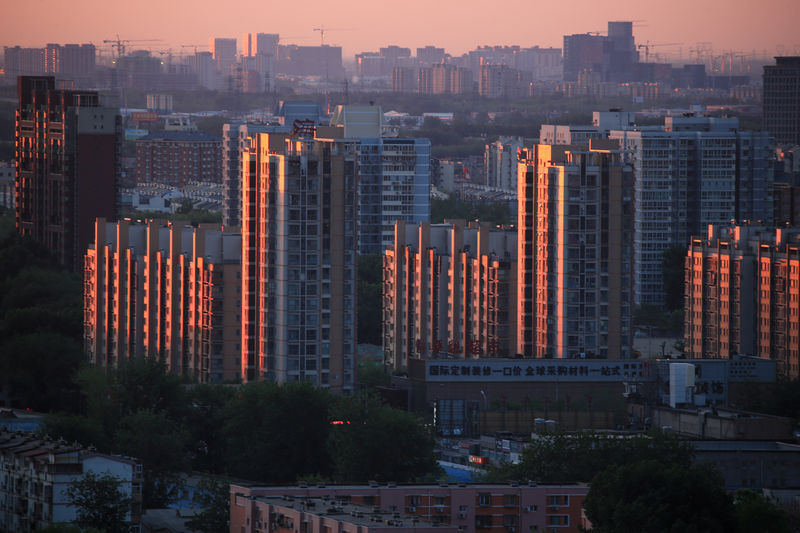By Yawen Chen and Ben Blanchard
BEIJING (Reuters) - New home prices in China grew at their slowest pace in 10 months in February in sign of slackening demand as the economy cools further, leaving authorities walking a tight rope between loosening some existing curbs and flushing out speculators.
Consumer and business confidence has slipped over recent quarters in the wake of heightened economic uncertainty and a yet-unresolved Sino-U.S. trade dispute, discouraging residential investment.
Average new home prices in China's 70 major cities rose 0.5 percent in February, slowing from a 0.6 percent gain in January and marked the lowest growth rate since April 2018, according to Reuters calculation of data released by the National Bureau of Statistics (NBS) on Friday.
On the whole, it logged the 46th straight month of price increases. Most of the 70 cities surveyed by the NBS still reported monthly price increases for new homes, though the number was down to 57 from 58 in January.
Xining, the capital of Qinghai province in central China by the Tibetan Plateau, was the top performer last month with a monthly price increase of 2.3 percent.
On an annual basis, home prices rose 10.4 percent in February, accelerating from a 10.0 percent gain in January.
Analysts say the overall price growth in the property market is still relatively healthy and note that the slowdown hasn't reached alarming proportions despite the pressure on demand stemming from a cooling economy.
Growth in the world's second-biggest economy slumped to near three-decade lows last year hit by the tariff row with the United States and Beijing's multi-year crackdown on debt.
"The data suggests some cities resorted to price-cutting to promote sales under the pressure of meeting sales targets amid a traditionally off-season for the market," said Yan Yuejin, director of the E-house China Research and Development Institution.
But Yan said some markets have showed signs of a rebound in February.
Prices growth in China's four top-tier cities - Beijing, Shanghai, Shenzhen and Guangzhou - rose 0.3 percent from a month earlier, slowing from a 0.4 percent gain in January, the statistics bureau said in a statement accompanying the data.
Tier-2 cities, which include most of the larger provincial capitals, increased 0.7 percent in February on a monthly basis, in line with the previous month, while in tier-3 cities they rose 0.4 percent, easing from 0.6 percent in January, the statistics bureau said.
FINE-TUNING POLICY
"For popular cities in the first- and second-tier cities, there is some possibility of a market recovery in March," said Zhang Dawei, an analyst with Hong Kong-based Centaline, a property consultancy.
Policymakers appear keen to avoid dealing a sharp knock to the real estate market as it directly influences 40 other business sectors in China and is key to tempering the economic slowdown.
Credit conditions have been on the looser side in recent months as China has cut the amount of cash banks keep as reserves five times since last year to boost lending to companies.
Some analysts say the extra liquidity will inevitably flow into the highly speculative property market. But policymakers have vowed to flush out speculators and prevent big fluctuations in housing values as they try to ensure that first-home buyers aren't completely priced out of the market.
New household loans, mainly mortgages, totaled 919.2 billion yuan ($136.69 billion) in February, accounting for 22.36 percent of total new loans last month, central bank data showed last week.
Some smaller cities have also quietly loosened curbs to prop up sentiment and demand, and Beijing appears to be showing a bigger tolerance as it emphasizes on a "city-based" approach that gives local governments more autonomy in policymaking.
Data on Thursday showed China's property investment quickened in the January-February period driven by strong demand in smaller cities. The upturn was likely supported by an acceleration in property construction as developers rush to meet pre-sale standard to put more projects into the sales market.
"Looking into the future we expect more cities will take measures to stabilize their own markets, but we don't expect Beijing to lift the curbs across the board," said Daniel Yao, head of research at JLL China, a property services and investment management company.

(For a graphic on 'China's cooling property market' click http://tmsnrt.rs/2BSc9Bx)